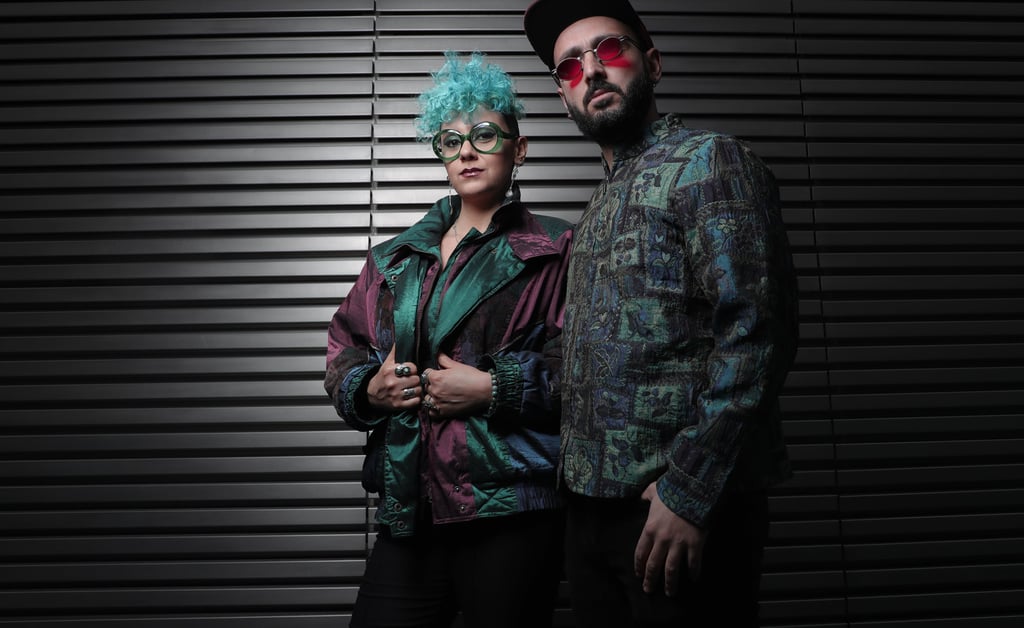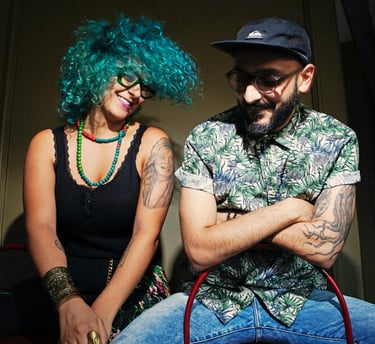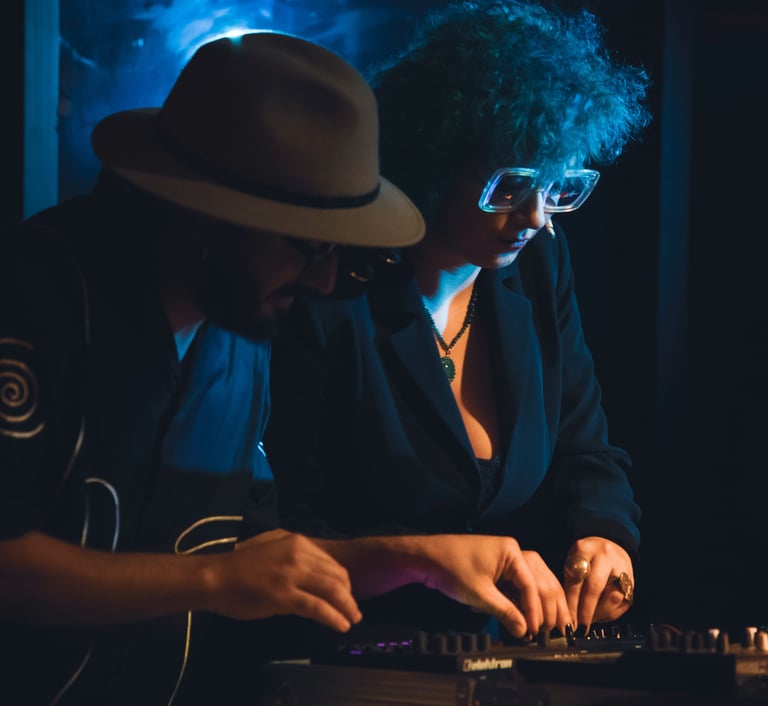
Interview with RUST
Rust is a dynamic duo whose music blends the Arabic heritage of melody and poetry with modern electronic beats. Combining elements of Arabic music with contemporary production and hypnotic vocals, Rust draws influence from the older generation of musical rebels, aiming to bridge the gap between legacy and modernity. (Source: rustduo.com)
Yara Berjawi
5/21/20238 min read


Photo credits: Obeida Kharfen
Thanks for joining me today! I'm really eager to get to know you both musically, and also on an individual level. Morethanindie interviews are mainly about shedding the light on your individual journeys as well as how you came about forming RUST. So, let's hear it!
Petra: Shall we start our individual introductions? Or.. together?
Hany: Well, yeah, I mean, we could..
Petra: Haha, you see, this is how we always are as a duo. So, my name is Petra Hawi. I studied Oud and Arabic singing in the Lebanese Higher Conservatory. When I grew up, I discovered my voice and started a Lebanese fusion, jazz, rock band called Fer2et 3a Nota in 2012.
In 2017, I went to Switzerland for a jazz singing workshop, which was really a turning point in my life as I realized music needs to be a part of my life. When I returned to Lebanon,I started studying Music Therapy and got my bachelor’s and master's degrees. And that's when I got exposed to the science, theory and history of Arabic music. In parallel I did a bachelor in Psychology. I love both music and therapy and I'm trying to balance those sides of me.
I started exploring my Arabic singing voice as I continued studying it in detail in private sessions; and that's when I met Hany while he was studying Oud with one of my previous teachers.
Rust was a structural shift for me personally. I challenged myself to get out of the comfort zone of what I used to know. It was a beautiful challenge, and this is where I found myself.
Petra, thank you so much for this introduction, it's so fascinating hearing your journey, the discoveries, ups and downs and how you're navigating your passions and experiencing such different disciplines simultaneously! So Hany, on to you - what's your story? Tell us about your journey so far.
Hany: I come from Damascus, I moved to Prague when I was 17 and I lived there for 15 years. My relationship with music started at a very young age, starting with keyboard and accordion, moving on to acoustic guitar as a teenager. I moved around in Syria, and you know back then, my parents - like all others in our side of the world - didn't take my musical interests seriously. Moving to Prague, I also got even farther away from it trying to adapt to the new culture.
I completed a master’s degree in Economics. I love Maths and Logic, so I enjoyed it somehow, but during my graduation everything just sunk in.
One of my friends got me into sound engineering and working with audio. It was quasi-music, a practical decision since I thought it was too late to go back to square one and study music. I worked in many studios and tried setting up my own studio in Prague. This was the segway to me getting into electronic music.
Coming out of Syria as a rebel, moving to Prague, going back to Lebanon was quite a ride. I went from one extreme to the other, carving my own way to find my own balance and identity. This discovery got me to realize that whatever I end up doing needs to mirror the duality that is within me. Going into a musical expression that is distant from this duality did not make sense. As part of nurturing my roots I started listening to a lot of traditional Arabic music. I was almost doing an audio cleanse for 6 months without listening to any Western music.
So interesting Hany. I'd love to hear about how you came to choose the oud? Was it an attempt to return to your Arab roots via this instrument? Was it part of your soul searching journey?
Hany: I started learning the oud at the end of 2020. For the first moment of grabbing the oud and strumming it, I immediately felt I am home. And yes, my main thing was electronic music. And given that I wasn't interested in creating fusion music with a beat and "plastered" Arabic vocals. It's what I would call "cocktail she'af" (a fruits cocktail). I had a strong interest in understanding Arabic music. Learning the oud was fundamental in truly grasping that music tradition.
Petra: And he did it so fast! It was surreal to watch his development. He found his passion, stuck to it and all of a sudden became "a pro". He came up with his first melody and I was so fascinated by it. I have a lot of respect for his learning journey with the oud.
Hany: I really felt so much connection to the oud. Even though I played the piano long before, it always sounded like a rookie. But with the oud, it just fit me. What I found most natural about bridging oud with electronic music was my love of melodies that can be composed on oud and the textures that electronic music offers.
Wow, really. Not to get too symbolic, but I will get too symbolic. Hearing this for the first time, it is so clear how your shift from the Arab world to studying Economics in a Western world, and then coming back to the Arab world translates in your music. I find that Economics has a lot of maths, structure and logic, and it seems like that study you did came to life into Electronic music. I'm being biased here, but as Arabs, we're more about the soul and emotion compared to a less emotive Western world. It sounds like you were able strike the balance to express your genuine self fluidly in music without restraint and still leverage your base in what you studied.
(scroll for more)


"This discovery got me to realize that whatever I end up doing needs to mirror the duality that is within me." - Hany
Photo credits: Raintree
So, tell me about how Rust was formed.
Petra: Hany moved to Beirut in 2019, and as an electronic music producer was looking for a singer to collaborate with. On the other hand I was looking for a new challenge and an opportunity to put my passion and knowledge of traditional Arabic signing into practice. My friend put us in contact, we had a meeting and very shortly after that we did our first rehearsal and “Rust” was born in September 2020.
The name came up during a photoshoot with our friend and one of the photos was in front of an old rusted garage door. We picked this photo as a cover for our first original release in a compilation album (curated by Beirut & Beyond festival) but still stuck with the name.
We studied the photo, saw the rust on the door, and there it was! The connection showed itself: In our music process, we are essentially finding very old poems and "removing the rust off of it" and presenting it in a new way. Rast - رَست is a word of Persian origins which represents one of the major Maqams (scales) in Arabic music.
We started working on our originals, but with the process, the songs came up to be a bit dark and solemn, which naturally expressed the living situation in Lebanon. We went through a journey to improve our sound and find the right balance between our intention in the music, how to be more free in our production process, testing music live before finalizing it at times, playing more live gigs, filming videos, etc… And here we are! I find it to be so enriching to continuously evolve. In some live performances, we improvise at times, and Hany and I are luckily so in-tune together that our outcome is uniform. Our show is no longer two separate entities given we're connecting two very different things.
Hany: We tried hard finding ways to connect our roles better. Sometimes, the method of blending Arabic sounds with the electronic genres was technically not working. At other times it was working perfectly, so there's been a lot of work and experimenting. We also started creating more content on social media with quick improvised sessions without rehearsing for too long, which helped us find our sound.
Let's zoom in a bit again on your music and your message. Your values are to maintain our culture and traditions, while shedding light on the history because it influences our present. How do you express these, do you feel the need to relay this and explain its importance?
Hany: You know, the music we do has a certain message; we can be Arabs without the need to submit to the generational trauma of being not good enough in a global context due to our history of colonialism and how the world sees us as Arabs. There's sometimes this tendency and a thirst to make music that looks like the Western world because "it's better". We believe that every sustainable development of our society starts by reforming our culture and traditions, instead of importing foreign models that are specific to their historical and geographical origins.
I find it important that the art expression we create is a mirror of who we are. I love all sorts of music, from Classical to Experimental. What I really look for in music is originality. Perhaps when you make music, you become more critical. I can respect other artists' work but when it's a copy of someone else's work, it doesn't stick. This is our aim at RUST, just make sure that we stay genuine to who we are in our music.
I think that originality is very evident in your music! How did your journey progress into releasing your EP last December?
Petra: It was a hectic ride. It takes a lot of work to transform a traditional Arabic song without losing its spirit. Perhaps someone might question what we're doing, but we believe we're just polishing these songs and making them more relevant to our generation, along with giving a nostalgic feeling for the generation of people who grew up listening to those songs.
Hany: “Echoes - صدى” is a rework of traditional Arabic songs by iconic artists such as “Om Kulthoum” and “Asmahan”, into different electronic genres ranging from Electronica to Trip-Hop and Techno. The album was released digitally on December 15th 2022 and it’s available on all streaming platforms. The 5 tracks in the album were produced during art residency in Bern-Switzerland in August 2022.


"It takes a lot of work to transform a traditional Arabic song without losing its spirit. " - Petra
Photo credits: Laetitia Hakim
What's next for RUST?
Hany: We are currently on our spring tour in Europe, which started in Switzerland and Berlin. It will continue to France where we’ll have 4 performances. Then we will be heading to Belgium for our last performance in this tour.
We're very happy to have signed a deal with the indie record label Wall of Sound in Spring 2023.We’re currently working on our first release with them, which will be published beginning of June 2023 with a music video.
Petra: Lots of things in the pipeline, in March 2023 Rust was selected to receive a grant from Culture Resource (n.p.o) as part of the Production Awards program to record and release an album in collaboration with Jana Salloum, a young Lebanese poet. This will allow us to explore new grounds in our own "lyrics".
We would also love to work more on experimental material such as acoustic and semi-acoustic nights, that we already tried on our tour.
Hany: Having different formats of our music would allow us to cater to a wider audience, depending on venues, different festivals and modes.
This all sounds very exciting! I can imagine how tough it is for musicians to be stuck somewhere. I find the beauty of independent music is that you have that freedom to shift around and explore what fits with the market while being genuine to your art expression.
Hany: It's quite difficult to make indie music in today's world. You have to consider what the market needs, what the audience enjoys, and what it is you want as an artist. It's a big juggle. Sometimes they intersect, and sometimes they don't.
It's been lovely, I think you can always release both! This has been great, thank you so much for your time. I really enjoyed this conversation.

